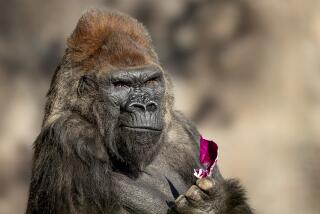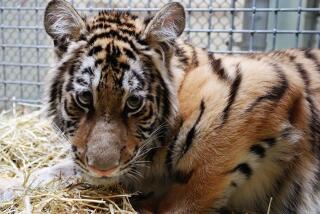Zoo Doctors Grab Tiger’s Health Woes by the Tail
- Share via
SAN DIEGO — As befits a tiger with a life-threatening toothache, the anesthetized Awang Relak was strapped down on a surgical table Friday at the San Diego Zoo for procedures to help save his life -- and maybe give his endangered species a boost.
A dental-medical team swarmed around the 240-pound Indochinese tiger’s head as dentist Dave Fagan worked to remove several defective teeth, clean out pockets of infection and pry smaller teeth away from larger ones.
At the nether region of the sleeping animal, another team of specialists was accomplishing another chore: removing sperm for the “frozen zoo,” the institution’s project to store sperm and eggs from endangered animals for possible use in reproductive efforts to stave off extinction.
Barbara Durrant, the zoo’s reproductive specialist, examined Awang Relak’s sperm under a microscope.
“It’s fair stuff,” she said. “He doesn’t have a high count, but he’s young.”
Measuring 6 feet when stretched out on the table, 3-year-old Awang Relak, whose name means “king of the Relak region,” came to San Diego in May from the Melaka Zoo in Malaysia.
It could be another year before he’s ready to impregnate the female, Mek Degong, also brought here from the Melaka Zoo.
But Awang Relak’s potential as a stud is moot if his dental woes are not corrected, zoo specialists said.
Outwardly he has the sleek and menacing beauty of his species, but his mouth is a mess.
In the wild, he would probably have starved because he could not kill or devour his prey because he lacked canine teeth -- one of several dental deficiencies.
Even in captivity, the infection might have weakened his heart and kidneys and ultimately killed him.
Tiger species around the globe are imperiled by poaching and habitat loss. The World Wildlife Fund has predicted that the Sumatran tiger may be the first mammal to go extinct in the 21st century.
San Diego, the Bronx Zoo and Omaha’s Henry Doorly Zoo have received tigers from Malaysia in recent years and are helping the Malaysian government with its anti-poaching efforts.
Dental surgery on zoo animals is never risk-free.
But with tigers, it’s doubly dubious. By nature, tigers are among the most aggressive predators in the world.
Awang Relak and Mek Degong were both captured in Malaysia to protect villagers and livestock.
Mek Degong, whose name means “mother,” was thought to have already been a man-eater.
Keepers here keep their distance, although they have been pulling Awang Relak’s tail -- through the bars of a “squeeze cage” -- to prepare him for occasional blood tests.
“We don’t try to make pets of our cats or to ‘tame’ them,” said Janice Owlett, who supervises the Tiger River exhibit, home to the zoo’s four Indochinese tigers.
“We try to give them the opportunity to act like tigers.”
In preparation for his trip to the dentist, Awang Relak was shot with a tranquilizer dart.
Once he was strapped on the table, anesthetic kept him unconscious while technicians monitored his breathing and heart.
“He was a fabulous patient,” veterinarian Nancy Boedeker said after the tiger’s three hours on the table.
And what if he had woken up suddenly?
“He would love to have you for lunch,” Owlett said.
More to Read
Sign up for Essential California
The most important California stories and recommendations in your inbox every morning.
You may occasionally receive promotional content from the Los Angeles Times.













